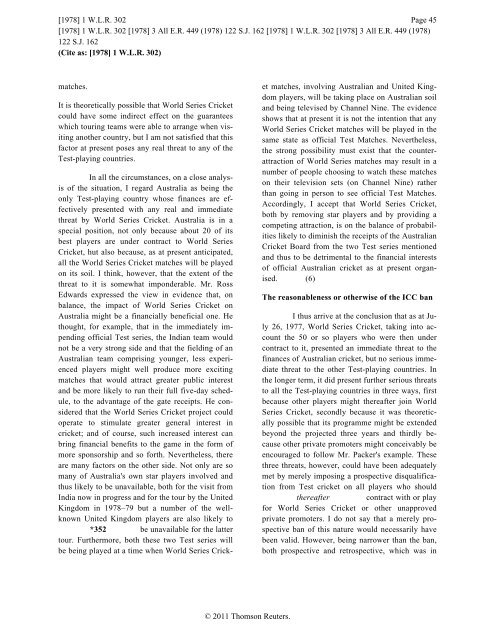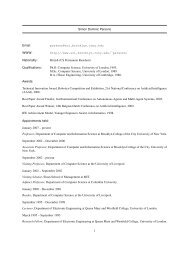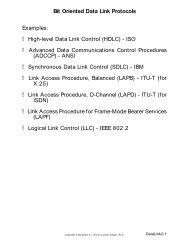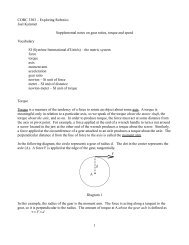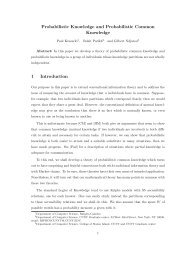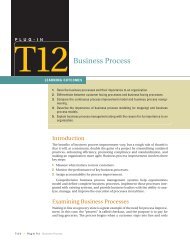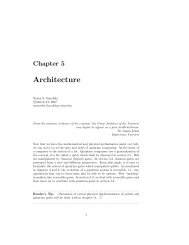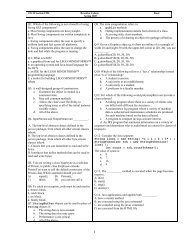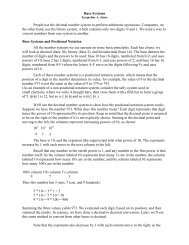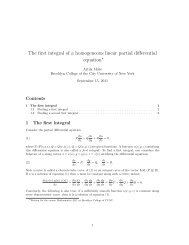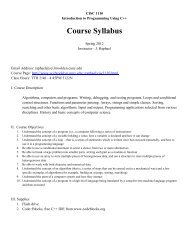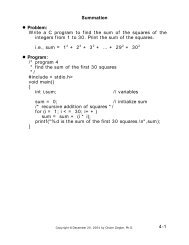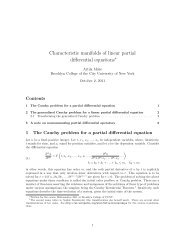*302 Greig and Others v Insole and Others 1977 G. No. 22461977 J ...
*302 Greig and Others v Insole and Others 1977 G. No. 22461977 J ...
*302 Greig and Others v Insole and Others 1977 G. No. 22461977 J ...
You also want an ePaper? Increase the reach of your titles
YUMPU automatically turns print PDFs into web optimized ePapers that Google loves.
[1978] 1 W.L.R. 302 Page 45<br />
[1978] 1 W.L.R. 302 [1978] 3 All E.R. 449 (1978) 122 S.J. 162 [1978] 1 W.L.R. 302 [1978] 3 All E.R. 449 (1978)<br />
122 S.J. 162<br />
(Cite as: [1978] 1 W.L.R. 302)<br />
matches.<br />
It is theoretically possible that World Series Cricket<br />
could have some indirect effect on the guarantees<br />
which touring teams were able to arrange when visiting<br />
another country, but I am not satisfied that this<br />
factor at present poses any real threat to any of the<br />
Test-playing countries.<br />
In all the circumstances, on a close analysis<br />
of the situation, I regard Australia as being the<br />
only Test-playing country whose finances are effectively<br />
presented with any real <strong>and</strong> immediate<br />
threat by World Series Cricket. Australia is in a<br />
special position, not only because about 20 of its<br />
best players are under contract to World Series<br />
Cricket, hut also because, as at present anticipated,<br />
all the World Series Cricket matches will be played<br />
on its soil. I think, however, that the extent of the<br />
threat to it is somewhat imponderable. Mr. Ross<br />
Edwards expressed the view in evidence that, on<br />
balance, the impact of World Series Cricket on<br />
Australia might be a financially beneficial one. He<br />
thought, for example, that in the immediately impending<br />
official Test series, the Indian team would<br />
not be a very strong side <strong>and</strong> that the fielding of an<br />
Australian team comprising younger, less experienced<br />
players might well produce more exciting<br />
matches that would attract greater public interest<br />
<strong>and</strong> be more likely to run their full five-day schedule,<br />
to the advantage of the gate receipts. He considered<br />
that the World Series Cricket project could<br />
operate to stimulate greater general interest in<br />
cricket; <strong>and</strong> of course, such increased interest can<br />
bring financial benefits to the game in the form of<br />
more sponsorship <strong>and</strong> so forth. Nevertheless, there<br />
are many factors on the other side. <strong>No</strong>t only are so<br />
many of Australia's own star players involved <strong>and</strong><br />
thus likely to be unavailable, both for the visit from<br />
India now in progress <strong>and</strong> for the tour by the United<br />
Kingdom in 1978–79 but a number of the wellknown<br />
United Kingdom players are also likely to<br />
*352 be unavailable for the latter<br />
tour. Furthermore, both these two Test series will<br />
be being played at a time when World Series Cricket<br />
matches, involving Australian <strong>and</strong> United Kingdom<br />
players, will be taking place on Australian soil<br />
<strong>and</strong> being televised by Channel Nine. The evidence<br />
shows that at present it is not the intention that any<br />
World Series Cricket matches will be played in the<br />
same state as official Test Matches. Nevertheless,<br />
the strong possibility must exist that the counterattraction<br />
of World Series matches may result in a<br />
number of people choosing to watch these matches<br />
on their television sets (on Channel Nine) rather<br />
than going in person to see official Test Matches.<br />
Accordingly, I accept that World Series Cricket,<br />
both by removing star players <strong>and</strong> by providing a<br />
competing attraction, is on the balance of probabilities<br />
likely to diminish the receipts of the Australian<br />
Cricket Board from the two Test series mentioned<br />
<strong>and</strong> thus to be detrimental to the financial interests<br />
of official Australian cricket as at present organised.<br />
(6)<br />
The reasonableness or otherwise of the ICC ban<br />
I thus arrive at the conclusion that as at July<br />
26, <strong>1977</strong>, World Series Cricket, taking into account<br />
the 50 or so players who were then under<br />
contract to it, presented an immediate threat to the<br />
finances of Australian cricket, but no serious immediate<br />
threat to the other Test-playing countries. In<br />
the longer term, it did present further serious threats<br />
to all the Test-playing countries in three ways, first<br />
because other players might thereafter join World<br />
Series Cricket, secondly because it was theoretically<br />
possible that its programme might be extended<br />
beyond the projected three years <strong>and</strong> thirdly because<br />
other private promoters might conceivably be<br />
encouraged to follow Mr. Packer's example. These<br />
three threats, however, could have been adequately<br />
met by merely imposing a prospective disqualification<br />
from Test cricket on all players who should<br />
thereafter contract with or play<br />
for World Series Cricket or other unapproved<br />
private promoters. I do not say that a merely prospective<br />
ban of this nature would necessarily have<br />
been valid. However, being narrower than the ban,<br />
both prospective <strong>and</strong> retrospective, which was in<br />
© 2011 Thomson Reuters.


